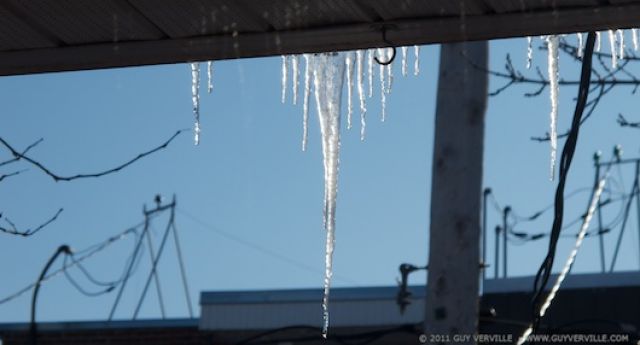
On Madison’s road many times stride
February 1, 2012
In his diary, which he describes as intimate, Laurent wrote a frank and pretty note, [Le troisième homme](http://navire.net/carnet-intime/2012/01/le-troisieme-homme.html). Laurent writes very well. I would add that he writes better than me. I also have a friend who writes much better than me, who has an exemplary syntax and vocabulary. In short, I might have wanted to write such a post, even if I don’t like its conclusions, especially since we are repeating here the endless Madison’s road story.
Yet it is a beautiful story, both Laurent’s and Robert James Waller’s. I might as well talk about my experiences in this area. I could tell the story of this friend of a friend who confessed to him, on his own wedding day, that she would have preferred to marry him rather than the one to whom she had just promised fidelity.
All nobles can be these confessed feelings, they describe at the same time the cowardice expressed in the realities of life. The art of the writer or actor is to lie, the art of the living is to act, and we happily navigate the winding road of compromises, infatuations, and opportunities to enjoy ourselves. One could argue that it is a man’s feeling to go from a handjob to the corner of a dark disco or elevator wall. It is true that the male quickly falls in love with the intensity of the moment, that his fantasized orgasm is entitled to a place in the pantheons of timeless love stories. However, women are no more protected from the furnace that burns in each of us. If they are like female birds (and I am almost sure of it), what they incubate in their nests is a skillful recipe for daily bread and dairy cream. We must remember that our biological clocks remember simpler times and still insist on giving us the time according to the same mechanism.
In short, we love our classics, and Laurent’s text is no exception. This love is so strong that it pushes the homosexual to do like the heterosexual, to reproduce the same paste. This model has certainly proved its worth. It secures, it keeps the economy running, and it allows you to end your days well. We realize the attraction for this atavistic reproduction when we see, on television, both the so-called reality series and the historical reconstructions of the well-done periods of the Edwardian bourgeoisie or the simple, complicated and corseted good times of colonization at the beginning of the 20th century when we do not happily dive into royal procrastinations or medieval churches.
We like to repeat, and we prefer to say to ourselves that there is nothing more to invent, that everything has been told.
Beware of sleeping water, frozen stories; beware of meteors that will appear in our futures. Happy who has certainties. Well misunderstood is the man who, in the depths of his docks, plunges his lungs full of air, knife in his mouth, towards the ropes that hold him back, to patiently cut them so that he never again sticks to the illusions of the promises of others.
Love is strangely like politics. We try so hard to reinvent ourselves by repeating and insisting. It is probably because, in the end, we are just helpless. Besides, life is so short, why go to all this trouble?
I search in vain for an answer, a sign. I’ll have to write about it.
Yet it is a beautiful story, both Laurent’s and Robert James Waller’s. I might as well talk about my experiences in this area. I could tell the story of this friend of a friend who confessed to him, on his own wedding day, that she would have preferred to marry him rather than the one to whom she had just promised fidelity.
All nobles can be these confessed feelings, they describe at the same time the cowardice expressed in the realities of life. The art of the writer or actor is to lie, the art of the living is to act, and we happily navigate the winding road of compromises, infatuations, and opportunities to enjoy ourselves. One could argue that it is a man’s feeling to go from a handjob to the corner of a dark disco or elevator wall. It is true that the male quickly falls in love with the intensity of the moment, that his fantasized orgasm is entitled to a place in the pantheons of timeless love stories. However, women are no more protected from the furnace that burns in each of us. If they are like female birds (and I am almost sure of it), what they incubate in their nests is a skillful recipe for daily bread and dairy cream. We must remember that our biological clocks remember simpler times and still insist on giving us the time according to the same mechanism.
In short, we love our classics, and Laurent’s text is no exception. This love is so strong that it pushes the homosexual to do like the heterosexual, to reproduce the same paste. This model has certainly proved its worth. It secures, it keeps the economy running, and it allows you to end your days well. We realize the attraction for this atavistic reproduction when we see, on television, both the so-called reality series and the historical reconstructions of the well-done periods of the Edwardian bourgeoisie or the simple, complicated and corseted good times of colonization at the beginning of the 20th century when we do not happily dive into royal procrastinations or medieval churches.
We like to repeat, and we prefer to say to ourselves that there is nothing more to invent, that everything has been told.
Beware of sleeping water, frozen stories; beware of meteors that will appear in our futures. Happy who has certainties. Well misunderstood is the man who, in the depths of his docks, plunges his lungs full of air, knife in his mouth, towards the ropes that hold him back, to patiently cut them so that he never again sticks to the illusions of the promises of others.
Love is strangely like politics. We try so hard to reinvent ourselves by repeating and insisting. It is probably because, in the end, we are just helpless. Besides, life is so short, why go to all this trouble?
I search in vain for an answer, a sign. I’ll have to write about it.

